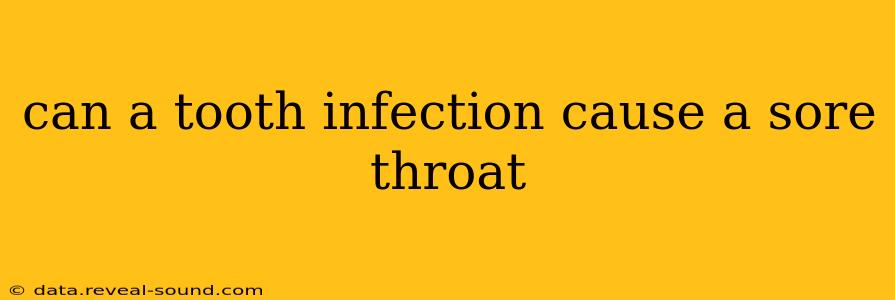Can a Tooth Infection Cause a Sore Throat? A Comprehensive Look at Oral-Throat Connections
A sore throat is a common ailment, often attributed to viral or bacterial infections. However, the cause isn't always straightforward. One surprising culprit? A tooth infection. While not the most frequent cause, a tooth infection can indeed lead to a sore throat, and understanding the connection is crucial for effective treatment.
This article explores the link between tooth infections and sore throats, delving into the underlying mechanisms and offering insights into diagnosis and management.
How Can a Tooth Infection Lead to a Sore Throat?
The connection between a tooth infection (also known as an abscess or dental infection) and a sore throat stems primarily from the proximity of the oral cavity to the throat. Infections, especially those that are severe or untreated, can spread through several pathways:
-
Direct Spread: A severe tooth infection, particularly an abscess, can spread directly to the surrounding tissues. The close proximity of the teeth to the throat means infection can extend along soft tissues and lymphatic channels, causing inflammation and pain in the throat. This is particularly true for infections of the lower molars.
-
Swallowing Infected Material: Pus or infected debris from a tooth abscess can be swallowed, irritating the throat lining and leading to a sore throat. This is less a direct infection and more of a chemical irritation.
-
Lymphatic System: The lymphatic system plays a crucial role in the body's immune response. Infection-fighting cells travel through the lymphatic system. If a tooth infection is significant, bacteria or their toxins can enter the lymphatic system, potentially affecting lymph nodes in the neck and causing inflammation that radiates to the throat.
-
Referred Pain: While not a direct infection, severe tooth pain can sometimes be felt as referred pain in the throat, creating the sensation of a sore throat. This is due to the intricate nerve pathways in the head and neck region.
What are the Symptoms of a Tooth Infection Causing Sore Throat?
Distinguishing between a sore throat caused by a tooth infection versus a typical throat infection requires careful observation of accompanying symptoms. Look for:
-
Severe Toothache: This is the primary indicator. The pain will likely be localized to the affected tooth but can radiate.
-
Swollen Gums: The gums around the infected tooth will likely be red, swollen, and tender to the touch.
-
Bad Breath: A persistent foul odor (halitosis) often accompanies tooth infections.
-
Fever: A high fever can signal a more serious infection.
-
Swollen Lymph Nodes: Swollen lymph nodes in the neck or jaw area are common with infections spreading through the lymphatic system.
-
Pus: Pus may be visible around the infected tooth or draining from the gums.
If you experience a sore throat alongside several of these symptoms, particularly a persistent toothache, it's crucial to seek dental attention promptly.
What Happens if it's Left Untreated?
Ignoring a tooth infection can lead to serious complications, extending beyond just a sore throat. The infection can spread to:
-
Jawbone: Severe infections can damage the bone structure supporting the teeth.
-
Sinuses: Infections can spread to the sinuses, causing sinusitis.
-
Brain: In extremely rare but serious cases, untreated tooth infections can lead to life-threatening conditions like brain abscesses. This is a medical emergency.
Prompt treatment with antibiotics and potentially a root canal or tooth extraction is essential to prevent such severe consequences.
How is it Diagnosed?
A dentist can accurately diagnose a tooth infection through a clinical examination, including:
-
Visual Inspection: Examining the teeth and gums for signs of infection.
-
X-rays: To identify the extent of the infection and damage to the tooth.
-
Palpation: Feeling the area around the tooth for swelling or tenderness.
How is it Treated?
Treatment for a tooth infection causing a sore throat focuses on eliminating the underlying dental issue. This usually involves:
-
Antibiotics: To combat the bacterial infection.
-
Root Canal: To save the affected tooth by removing the infected pulp.
-
Extraction: If the tooth is beyond saving, extraction is necessary.
Once the dental infection is addressed, the sore throat typically resolves. However, if the throat remains sore, a doctor should be consulted to rule out other causes.
This information is for educational purposes only and does not constitute medical advice. If you suspect a tooth infection, consult a dentist immediately for proper diagnosis and treatment. Prompt action is crucial to prevent complications and ensure your overall oral and general health.
